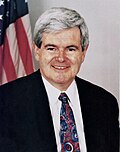| ||
|---|---|---|
U.S. Speaker of the House 2012 presidential election Organizations
Writing
| ||
This is the electoral history of Newt Gingrich. Gingrich, a Republican, served as the 50th Speaker of the United States House of Representatives from 1995 until his resignation in November 1998. He represented Georgia's 6th congressional district as a Republican from 1979 until his resignation in January 1999. In 2012, Gingrich was a candidate for the Republican Party presidential nomination.
Contents
- Georgia's 6th congressional district
- 1974 election
- 1976 election
- 1978 election
- 1980 election
- 1982 election
- 1984 election
- 1986 election
- 1988 election
- 1990 election
- 1992 election
- 1994 election
- 1996 election
- 1998 election
- Speaker of the House of Representatives
- 1995 election
- 1997 election
- United States President
- 2012
- See also
- Notes
- References


